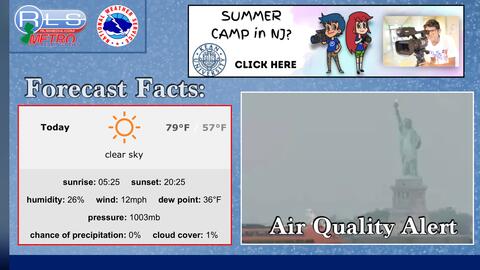New Jersey alone has been plagued by nine significant wildfires this year, contributing significantly to the deteriorating air quality in the region. -NWS
By: Richard L. Smith
Newark and the surrounding North Jersey region will experience yet another day of distressing air quality on Wednesday as residents prepare for horrible conditions that can cause deteriorating breathing.
According to The National Weather Service, Tuesday's thick smoke conditions marked one of the worst instances in air quality since air quality records have been kept.
This alarming trend is not limited to the local area, as almost a third of America is currently under a poor air quality alert, primarily due to the far-reaching impact of Canadian wildfires.
NWS meteorologists say around 1 p.m. today, the dire haze conditions will worsen, with heavy concentrations of smoke engulfing Essex, Passaic, Morris, Union, and Middlesex Counties.
The combined effects of these factors have resulted in hazardous breathing conditions and health risks for the region.
The heightened air pollution can be attributed to a combination of factors, including the prevalence of Canadian wildfires and local incidents.
Today's weather conditions in Newark and North Jersey will feature a humidity level of 58% and a westward wind speed of 13 mph.
The barometric pressure will measure at 29.64 in, with widespread haze and patchy smoke.
Despite these unfavorable conditions, the day will start out sunny, with temperatures reaching a high near 80 degrees Fahrenheit. A gentle northwest wind of approximately 10 mph will offer a slight respite, though it will be tough to alleviate the persistent air pollution.
As Newark and the North Jersey region continue to grapple with this ongoing air quality crisis, it is imperative for residents to stay informed by clicking HERE on RLS Media and following guidelines provided by health authorities.

